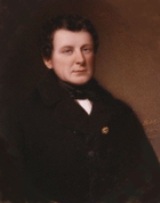
(1869–1948) and Martin Luther King (1929–1968). He was told by William Makepeace Thackeray
(1811–1863) "you have done more for your nation than any man since Washington ever did." William Gladstone
(1809–1898) described him as "the greatest popular leader the world has ever seen." Honoré de Balzac
(1799–1850) wrote that "Napoleon and O'Connell were the only great men the 19th century had ever seen." Jean-Henri Merle d'Aubigné
(1794–1872) wrote that "the only man like Luther, in the power he wielded was O'Connell." William Grenville (1759–1834) wrote that "history will speak of him as one of the most remarkable men that ever lived." O'Connell met, befriended, and became a great inspiration to Frederick Douglass
(1818–1895) a former American slave who became a highly influential leader of the abolitionist movement, social reformer, orator, writer and statesman.
However, the founder of the Irish Labour Party and executed Easter Rising
leader James Connolly
, devoted a chapter in his 1910 book "Labour in Irish History" entitled "A chapter of horrors: Daniel O’Connell and the working class.".
Gentlemen, you may soon have the alternative to live as slaves or die as free men![]()
Good God, what a brute man becomes when ignorant and oppressed. Oh Liberty! What horrors are committed in thy name! May every virtuous revolutionist remember the horrors of Wexford!![]()
My days – the blossom of my youth and the flower of my manhood – have been darkened by the dreariness of servitude. In this my native land – in the land of my sires – I am degraded without fault as an alien and an outcast. ![]()
How cruel the Penal Laws are which exclude me from a fair trial with men whom I look upon as so much my inferiors... ![]()
I want to make all Europe and America know it – I want to make England feel her weakness if she refuses to give the justice we the Irish require – the restoration of our domestic parliament...![]()
There is an utter ignorance of, and indifference to, our sufferings and privations….What care they for us, provided we be submissive, pay the taxes, furnish recruits for the Army and Navy and bless the masters who either despise or oppress or combine both? The apathy that exists respecting Ireland is worse than the national antipathy they bear us. ![]()
No person knows better than you do that the domination of England is the sole and blighting curse of this country. It is the incubus that sits on our energies, stops the pulsation of the nation’s heart and leaves to Ireland not gay vitality but horrid the convulsions of a troubled dream. ![]()
The principle of my political life …. is, that all ameliorations and improvements in political institutions can be obtained by persevering in a perfectly peaceable and legal course, and cannot be obtained by forcible means, or if they could be got by forcible means, such means create more evils than they cure, and leave the country worse than they found it.![]()
No man was ever a good soldier but the man who goes into the battle determined to conquer, or not to come back from the battle field (cheers). No other principle makes a good soldier.![]()

